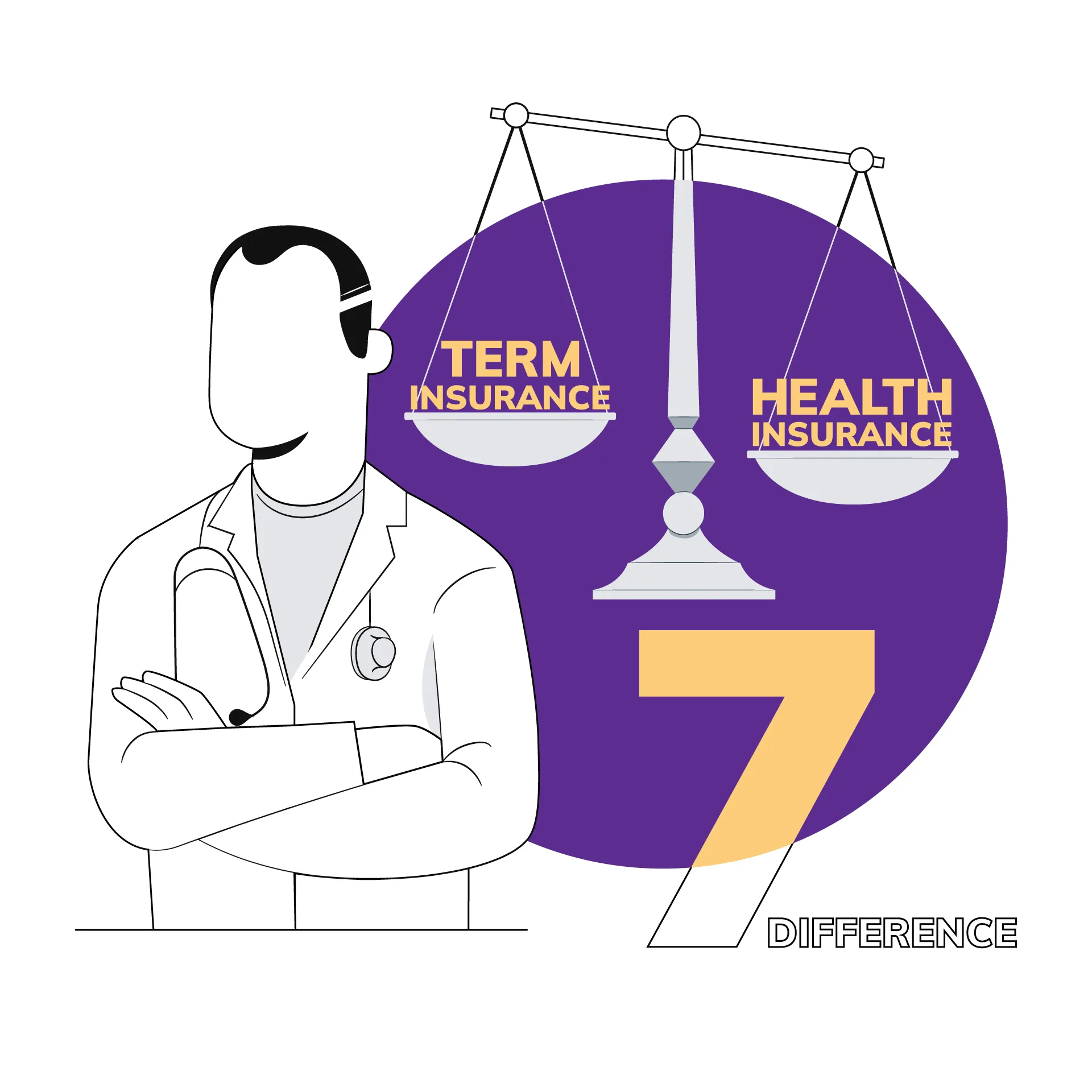Aarogya Care | 5 min read
Term Insurance vs Health Insurance: 7 Key Differences You Need to Know
Medically reviewed by
Table of Content
Key Takeaways
- Health insurance covers medical expenses during an emergency or treatment
- Term insurance may offer coverage on maturity or if the insured dies
- You can avail tax benefits on premiums of both term and health insurance
From securing your life to protecting your assets, you can buy insurance for almost everything. If you live a fast-paced and stressful life, insurance helps keep you and your family financially secure in times of crisis. To cater to various situations, there are different types of insurance policies. Some have tax-saving benefits as well, making them a viable investment.
The 2 common options when buying insurance are term insurance and health insurance. They are two very different instruments and this may leave you wondering which one to pick. While you can invest in both types, your decision should be based on your needs.
Read on to know more about the differences between term and health insurance and how to choose them.
Purpose
Health insurance policies help you during a medical emergency or treatment. They reduce your financial burden because the insurer will cover the medical expenses. There are many types of health insurance policies. While some may cover different family members in a single plan, some policies focus on covering specific conditions or illnesses.
Term insurance is a type of life insurance plan. It provides financial cover to the nominee after the demise of the policyholder. The benefits of your term insurance are dependent on the type of policy you buy.

Cover offered
Health insurance policies will offer coverage for medical expenses. These may include emergency as well as planned treatment expenses. The inclusions and exclusions of your coverage are dependent on the type of policy you have. With a health insurance policy, you can get coverage for:
- Yourself
- Your family members
- A pre-existing condition
- Critical illness
- Maternity expenses
A term insurance policy provides financial stability to your family members or nominee in event of the untimely death of the policyholder. This applies before the end of the policy tenure. The cover your family gets will depend on the type of term insurance you opt for. Some term insurance plans may offer multiple payout options. This means that your family may get monetary benefits as and when required or as a lumpsum amount.
Additional read: Maturity Amount and Sum AssuredMaturity
Health insurance is generally renewed every year and does not have any maturity benefits. You can avail benefits of health insurance during the policy tenure and not at the end. In case you do not renew your health insurance plan, your policy will lapse and you won’t be able to avail its benefits.
Term insurance maturity is when the policy tenure ends. Depending on the type of policy you may or may not get the assured amount. In case you have a premium return term plan, you will receive that amount when your policy matures.Premium
In health insurance, your premium amount gets affected by factors such as:
- Age
- Existing health conditions
- Number of persons covered
- Type of policy
The premium amount may change every year and you can pay it in full or in parts.
With term insurance policies, the premium amount is dependent on the type of plan you opt for. The premium amount usually stays the same and does not change till maturity or payout. When compared, the premium of term insurance is usually lower than that of a health insurance policy.
Time period
Most insurance providers offer health insurance for a period of one year. After this period, you have to renew your policy if you want to enjoy its benefits. However, there are some companies, which offer health insurance for a period of up to 5 years [1]. This timeline can differ from one insurer to another. It is entirely dependent on the insurer and its policies.
Depending on the policy types, the term insurance plans are available for a period of up to 30 years. This period may also change and depends on the age at which you buy the policy.

Entry age
There is no entry age for a health insurance policy. However, it is recommended that you purchase one at the earliest. This is because your age is one of the major factors in deciding your premium amount. The younger you are, the lower your premium amount will be. Apart from this, purchasing at an early age also gives you other benefits like a short waiting period or No Claim Bonus options.
The minimum age requirement for term insurance is 18 years and the maximum is 65 years [2]. Since term insurance policies may have a maximum period of 30 years, it is advisable to purchase term insurance on the basis of your retirement plan. This is because most term plans do not have maturity benefits. The plans that offer such benefits usually mature when you reach 70 years of age.
Tax benefits
Health insurance premiums you pay are eligible for tax deduction under section 80D of the Income Tax Act. Similarly, the premiums for term insurance are deductible under section 80C. You are also eligible for tax deductions on maturity benefits as per under section 10(10D) [3].
Additional benefits: Section 80D of Income Tax ActNow that you know the difference between term insurance and health insurance, make sure that you compare different types of policies when finalizing your purchase. Before choosing between these two, take into account your:
- Financial responsibilities
- Age
- Profession
- Existing health conditions.
If you are looking for health insurance policies, you can find viable options from Complete Health Solution plans available on Bajaj Finserv Health. The plans come with lab tests benefits, doctor consultation reimbursements and many other benefits to ensure you stay in the pink of health without hurting your savings.
References
- https://www.policyholder.gov.in/You_and_Your_Health_Insurance_Policy_FAQs.aspx
- https://www.irdai.gov.in/ADMINCMS/cms/whatsNew_Layout.aspx?page=PageNo2982&flag=1
- https://www.incometaxindia.gov.in/tutorials/11.tax%20free%20incomes%20final.pdf
Disclaimer
Please note that this article is solely meant for informational purposes and Bajaj Finserv Health Limited (“BFHL”) does not shoulder any responsibility of the views/advice/information expressed/given by the writer/reviewer/originator. This article should not be considered as a substitute for any medical advice, diagnosis or treatment. Always consult with your trusted physician/qualified healthcare professional to evaluate your medical condition. The above article has been reviewed by a qualified doctor and BFHL is not responsible for any damages for any information or services provided by any third party.





